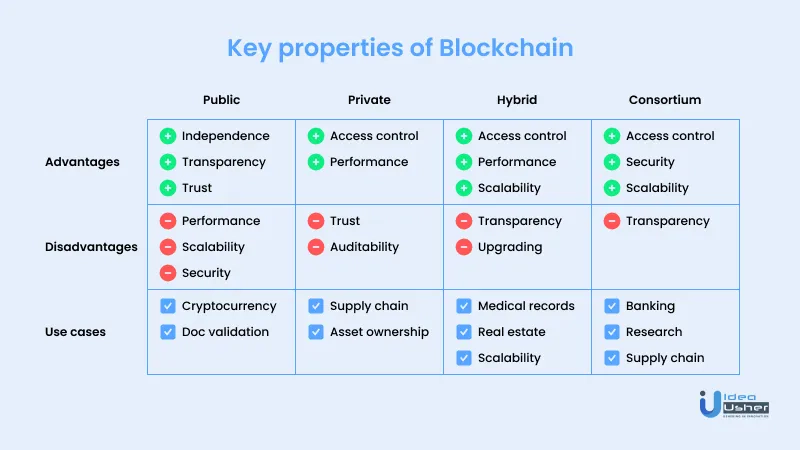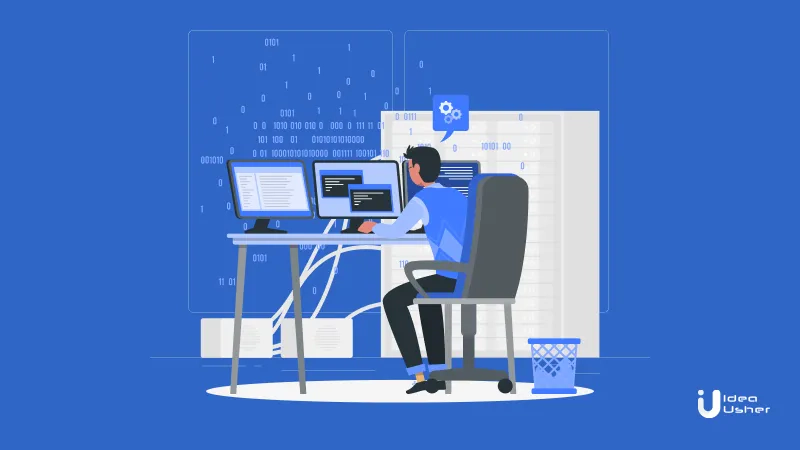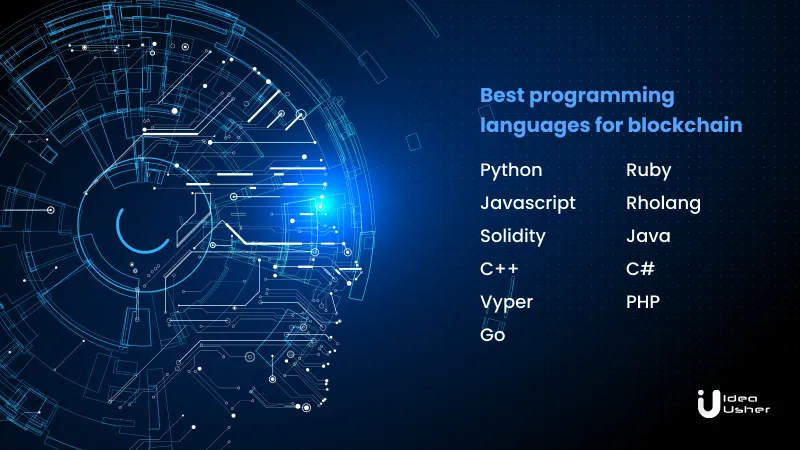
Blockchain offers an alternative safe, secure, and excellent approach to standardizing how people transfer and receive money. The advancement of this technology has resulted in benefits in various industries. In this article, you will learn the basics and the best programming languages for Blockchain app development.
You are not alone if you have heard of Bitcoin and decentralized finance lately. Blockchain is the underlying technology that powers them. It has evolved into a multibillion-dollar industry, with more and more businesses seeking new ways to incorporate it.
What Is Blockchain & How Does It Function?
Blockchain can be defined as a digital ledger of transactions. The ledger is spread across the complete network, consisting of computers that are linked to the blockchain. Each block holds several transactions. Whenever a fresh transaction is added, the blocks of every participant in the chain receive a record of that transaction information.
Adding new blocks in the blockchain network necessitates inter-node communication and subsequent validation. For a new block to be registered, all the P2P network participants must accept it through consensus. There are a few consensus mechanisms, such as Proof-of-Work(Bitcoin), Proof-of-Stake(ADA), Proof-of-Authority, etc.
These blocks get incorporated into the blockchain chronologically and comprise digital blocks of transactions. The best part is that it’s impossible to alter the recorded data without impacting all the following blocks. Therefore, even the slightest changes made to the blockchain can be observed by all participants. This makes it incredibly difficult, almost impossible, to compromise the system.
And, even if it gets compromised, it can be restored, thanks to its decentralized nature!
Types Of Blockchains
Before diving into what is blockchain coding, you should be aware of its types! Broadly, blockchain has four distinct network types. They are:
1. Permissionless Blockchain (public)
This type of blockchain is available(accessible) to all network participants on any device. A user can join the blockchain, complete transactions, validate them, and remain anonymous at the same time. For instance, Bitcoin is the most well-known permissionless blockchain.
It is ideal for developing apps that will be accessible to many people.
2. Permissioned Blockchain (Private)
A permissioned or private blockchain is only accessible to its authorized participants. Generally, it comes with specific rules that regulate the transactions of nodes(network participants). Organizations that deploy permissioned blockchains mostly do so for internal purposes.
The transaction validators in such a set-up belong to the same organization.

3. Hybrid Blockchain
A hybrid blockchain is a mix of the two types of blockchains mentioned above(permissionless & permissioned). Organizations benefit by incorporating the elements from the two worlds in a few scenarios.
Hybrid blockchain facilitates the establishment of a private system in compilation with a public one. It allows an organization to regulate who has access to certain stored data in the blockchain. The scope of data available to all network participants is also determined by it.
4. Consortium Blockchain
A consortium blockchain is also popularly known as a “federated” blockchain. It is pretty similar to a private blockchain with a particular group having access to it.
A validator node on the consortium blockchain is capable of initiating, receiving, and validating transactions. On the other hand, the member nodes can only initiate/receive transactions. When it comes to validation, the doors remain shut for them.
Top 13 Programming Languages For Blockchain App Development
Here is a list of the best programming languages for blockchain app development that you can learn in 2022!
1. Python
Python is no longer restricted to applications, network servers, and IoT development. With the advent of blockchain, it is proving its worth in the space of Blockchain-as-a-service.
Thanks to its exceptional features, the popular language is widely utilized for decentralized applications & smart contracts. Here is a glimpse of those features that makes it suitable as a blockchain programming language:
- Ease of access to a dynamic architecture.
- An ideal choice for both scripting & base techniques.
- Impeccable open-source support.
- Python offers easy-to-learn blockchain coding, and it is also great when it comes to prototyping.
Hyperledger Fabric & Steem are two of the popular Python-based blockchain projects as of now.
2. JavaScript
When coupled with the frameworks such as Node.js, a well-established language, JavaScript, presents a myriad of advantages to the developers.
- A blockchain programmed in JavaScript paves the way for an easier & faster entry into the nascent market.
- JavaScript can enhance the scalability of a blockchain.
- Various blockchain JavaScript frameworks are available.
- There is no need to deal with the inconvenience of integrating respective resources

3. Solidity
Inspired by C++, JavaScript, and Powershell, Solidity is one of the fastest-growing blockchain programming languages. It is widely utilized to code smart contracts executed on the Ethereum Virtual Machine (EVM).
It is a new-age programming language (developed by Vitalik Buterin) that focuses on simplicity and has a massive fan base among Ethereum developers. A Turing-complete and contract-oriented programming language, the headcount of Solidity developers is 200,000+ and growing.
The blockchain programming language offers many benefits to blockchain development companies, such as:
- JavaScript infrastructures, debuggers, + additional tools accessibility.
- Statically-typed programming.
- Potential to inherit properties within smart contracts.
- Developer-friendliness & impeccable accuracy
4. C++ (Powering Bitcoin!)
C++ is already one of the most established languages (developed in 1985), and it is valuable even for the new-generation blockchain technology! Thanks to its 360-degree capabilities, such as advanced multi-threading, move semantics, elementary control over memory, and object-oriented features such as run-time polymorphism, function overloading, and much more, it is pretty popular in blockchain coding.
C++ empowers blockchain developers with its fine-grained control. Unlike higher-level languages, C++ grants direct memory manipulation, making it ideal for performance-critical blockchain tasks. This control extends to object behavior with function overloading and runtime polymorphism, allowing developers to tailor data structures for specific blockchain needs.
C++’s multithreading capabilities further enhance efficiency, enabling parallel processing of transactions within a blockchain network. Popular blockchains like Bitcoin, Ripple, and Stellar leverage C++’s strengths for their core infrastructure.
5. Vyper
Vyper is a relatively new blockchain programming language, and it is inspired by Python 3. Thus, even if Vyper does not contain all the features of Python, the syntax for Vyper is also applicable in Python 3.
Vyper intends to be an alternative to Solidity. Similar to Solidity, Ethereum Virtual Machine (EVM) is where it is mostly used. Vyper has distinct control structures and tackles security issues quite differently.
6. Go
Go is a statically-typed programming language (created by Google). It has been developed by incorporating the convenience of code development with the power of compiled language.
It is a terrific choice to develop fast and efficient blockchain systems.
An ideal language for designing a hyper-ledger network, Go serves as a good foundation to produce Blockchain apps. Other top-notch features include classes & inheritance, generics, annotations, constructors, exceptions, etc. The Go language network has a massive 800,000+ developers.
7. Ruby
Ruby is the best language for blockchain development to headstart your career. Created in the mid-1990s, this general-purpose and high-level programming language facilitates developers to prototype their vision quickly. It does so with third-party APIs & plugins(open-source).
In contrast to C++, Ruby prioritizes developer experience. Created by Yukihiro Matsumoto in Japan, Ruby emphasizes simplicity and productivity. This translates to a user-friendly language that works seamlessly across various operating systems.
While not as widely used in core blockchain development, Ruby’s strength lies in its third-party libraries and plugins. These tools empower developers to build blockchain applications by leveraging Ruby’s multi-paradigm capabilities. However, Ruby’s debugging process can be challenging, and it may introduce occasional runtime errors. Additionally, its processing speed falls behind some other languages, and it offers less flexibility for complex blockchain tasks.
8. Rholang
Rholang is considered an excellent choice for smart contract development. The language comes with a functional approach instead of the traditional object-oriented approach. Thus, it is pretty helpful in cracking many blockchain problems, which fuels its popularity.
Rholang applications assess the whole problem like a series of functions and solve them sequentially. This approach is in stark contrast with languages such as Python, Java, C, etc. The latter set of languages uses variables to store data & change the variable value with time.
In short, Rholang comes with a unique functional programming approach that makes it a language to check out for new-age developers!

9. Java
Java is another traditional programming language that makes it to this list even in 2022! It is highly suitable for blockchain development.
The language follows C-syntax. It is popular for being used in the development of suave dApps(decentralized apps) and smart contracts.
These properties are what make it popular:
- Strong OOP Support (Object-Oriented Programming) methodology.
- Ease of memory cleaning.
- Vast libraries are available for developers.
The best examples of blockchain solutions that demonstrate the prowess of Java are IOTA, NEM, Hyperledger Fabric, etc.
Also Read: How Much Does It Cost To Build Blockchain Projects?
10. C#
This OOP language offers a bunch of features for enterprise-powered apps and cross-platform development. Also, it is armed with features of C, .NET, and SQL frameworks & appeals to blockchain developers.
- It is open-source.
- Its syntax is easy to understand & learn.
- It allows blockchain app developers to author portable code across devices.
From dApps to smart contracts and infrastructure in a Blockchain environment, C# can be used to develop all.
C#, a darling of the .NET world developed by Microsoft, boasts a massive following of 5-8 million developers globally. Unlike C++, C# shields programmers from memory management headaches with automatic garbage collection. This focus on developer experience extends to its rich class library, offering pre-built functionality that streamlines coding.
C#’s assembly concept simplifies version control and fosters robust distributed systems. However, C# prioritizes safety and ease of use, sacrificing some control. Developers cannot directly interact with hardware through drivers, and its reliance on a Just-In-Time compiler for machine code generation can introduce a slight performance overhead compared to languages with direct compilation. Despite these limitations, C#’s strengths make it a popular choice for blockchain platforms like Stratis, NEO, and IOTA.
11. PHP
PHP (Hypertext Preprocessor) is another language utilized to develop blockchain solutions of varying complexity. The popularity of PHP can be attributed to its object-oriented feature & huge community support.
Despite its popularity in web development, PHP isn’t a champion for blockchain programming. While open-source and platform-independent, its ease of use comes at a cost. The language’s reliance on runtime interpretation can lead to frequent errors, hindering the performance-critical nature of blockchain applications.
Additionally, modifying core functionalities can be challenging, limiting flexibility for developers. While its built-in database features might seem appealing, for large-scale blockchain projects, more robust languages often reign supreme. However, PHP’s extensive library collection and passionate community make it a potential option for specific, less resource-intensive blockchain tasks.
Here is an example of a simple open-source PHP Blockchain available on GitHub.
It shows a simple implementation of the blockchain data structure(proof-of-work).
12. Rust
Though a new entrant in the Blockchain ecosystem, Rust has already made its name in developing visionary, secure, and immutable solutions. It allows open-source developers to develop fast & potent blockchain frameworks.
It can also manage mutable states, optimize code, have better memory options & concurrency-based prospects.
Rholang stands out as a young contender in the realm of blockchain programming languages. This user-friendly language prioritizes clarity, offering a clean syntax that minimizes cognitive load for developers. Designed for speed and security, Rholang leverages the Rchain world to execute code.
However, its novelty presents both advantages and challenges. While the fresh perspective can be a breath of air for experienced developers, the limited user base and nascent ecosystem might pose hurdles for beginners seeking abundant resources and established libraries. Overall, Rholang offers an intriguing option for blockchain development, but its suitability depends on the project’s specific needs and developer experience level.
13. CX
CX is the last to feature in our list of best programming languages for Blockchain app development in 2022.
The innovative language has great potential to function as a contractual digital intermediary. What’s more, it comes loaded with features like an option to utilize propelled cuts, arrays, and pointers in addition to a simplistic error-control process.
It can also be assembled over Go to relieve users from executing discretionary codes, which is a critical roadblock. The language can also integrate with OpenGL (Open Graphics Library) efficiently. It aids the developers in reaping promising benefits from an augmented GPU capacity.
Wrapping Up
Heading into 2024 and beyond, these are the best programming languages for blockchain app development. Each of the aforementioned languages is distinct in its potential and thus gets utilized for developing a range of blockchain & cryptocurrency-based solutions. If you are scouting for the best developers who are well-versed in blockchain programming languages, feel free to contact our experts!
FAQ’s
Q. What programming languages are used for blockchain development?
There isn’t one single language! Many languages are used, including popular ones like Python, Java, JavaScript, and C++. Some blockchains also have their own specific languages, like Solidity for Ethereum.
Q. Solidity vs. Python for Blockchain Development
Both Solidity and Python are popular choices, but for different reasons. Solidity is specifically designed for writing smart contracts, which run on blockchains like Ethereum. Python is a general-purpose language that can be used for various aspects of blockchain development, like building backend systems or scripting interactions with a blockchain.
Q. Best technology for developing a blockchain app?
The “best” technology depends on your specific needs. Ethereum is a popular choice for general-purpose blockchain apps, while Hyperledger Fabric is designed for private blockchains. There are many other options as well!
Q. Is Go used for blockchain programming?
Yes, Go is a language gaining traction in blockchain development. It’s known for being fast, efficient, and secure, making it a good fit for building blockchain applications.













Soham Roy